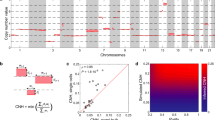Abstract
Cancer cells differ from healthy cells by massively altered genomes. This includes point mutations as well as chromosomal rearrangements and changes in chromosome numbers. Novel in vitro models mimic chromosomal aberrations and allow their systematic analysis. Here we present recent findings how changes in chromosome numbers and their structure alter physiology of human cells and instigate further genomic instability, thus recapitulating the processes that occur during tumorigenesis.
Similar content being viewed by others
Literatur
Boveri T (2008) Concerning the origin of malignant tumours by Theodor Boveri. Translated and annotated by Henry Harris. J Cell Sci 121(Suppl 1):1–84
Chunduri NK, Storchova Z (2019) The diverse consequences of aneuploidy. Nat Cell Biol 21:54–62
Passerini V, Ozeri-Galai E, de Pagter MS et al. (2016) The presence of extra chromosomes leads to genomic instability. Nat Commun 7:10754
Zuo E, Huo X, Yao X et al. (2017) CRISPR/Cas9-mediated targeted chromosome elimination. Genome Biol 18:224
Stephens PJ, Greenman CD, Fu B et al. (2011) Massive genomic rearrangement acquired in a single catastrophic event during cancer development. Cell 144:27–40
Zhang CZ, Spektor A, Cornils H et al. (2015) Chromothripsis from DNA damage in micronuclei. Nature 522:179–184
Bielski CM, Zehir A, Penson AV et al. (2018) Genome doubling shapes the evolution and prognosis of advanced cancers. Nat Genet 50:1189–1195
Kuznetsova AY, Seget K, Moeller GK et al. (2015) Chromosomal instability, tolerance of mitotic errors and multidrug resistance are promoted by tetraploidization in human cells. Cell Cycle 14:2810–2820
Lens SMA, Medema RH (2019) Cytokinesis defects and cancer. Nat Rev Cancer 19:32–45
Bakhoum SF, Cantley LC (2018) The multifaceted role of chromosomal instability in cancer and its microenvironment. Cell 174:1347–1360
Author information
Authors and Affiliations
Corresponding author
Additional information
Sara Vanessa Bernhard 2013–2016 Bachelor „Biowissenschaften‟ an der TU Kaiserslautern. 2016–2018 Master „Cell- and Neurobiology‟ an der TU Kaiserslautern. Dort seit 2018 Promotion in der Abteilung Molekulare Genetik.
Zuzana Storchova 1995–1999 Promotion an der Karls-Universität Prag, Tschechien. 1999–2001 Post-doc am Institute of Molecular Cancer Research, Universität Zürich, Schweiz. 2001–2007 Postdoc am Dana-Farber Cancer Institute/Harvard Medical School, Boston, MA, USA. 2008–2016 Gruppenleiterin am Max-Planck-Institut für Biochemie, Martinsried. Seit 2016 Professorin für Molekulare Genetik der TU Kaiserslautern.
Rights and permissions
About this article
Cite this article
Bernhard, S.V., Storchova, Z. Neue Einblicke in die Entstehung von komplexen Karyotypen bei Krebs. Biospektrum 25, 382–384 (2019). https://doi.org/10.1007/s12268-019-1065-3
Published:
Issue Date:
DOI: https://doi.org/10.1007/s12268-019-1065-3




